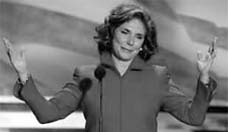
Chris Matthews interviews James Webb who says "I think that by putting our people in Iraq, we certainly made them targets in a way that they wouldn‘t have been if we were fighting the war against international terrorism from a position to maneuver"
MATTHEWS: Welcome back to HARDBALL. Were 18 Army reservists right to disobey orders to transport fuel in Iraq because they considered the mission too dangerous? James Webb served as—he served as secretary of the Navy during the Reagan administration. He‘s author of the new book, “Born Fighting.” You‘re a fighting man, right?
JAMES WEBB, FORMER SECRETARY OF THE NAVY: I have been, I have been, yes.
MATTHEWS: You have the instinct of a soldier, right?
(CROSSTALK)
MATTHEWS: What do you make of—what did you think when you heard about these reservists saying, you know, the fuel is contaminated, it is a dangerous mission, it‘s in a dangerous area, we‘ve been hit there before. We are not going to do it?
WEBB: Well, first of all, when you look at soldiers and at the duty to obey orders, I also represented a so-called war criminal for six years at one point, who killed himself halfway through, I finally cleared his name after six years, but I got really involved in the legal side of this as well.
And all the courts start with the premise that a soldier is a reasoning agent. They‘re not automatons. There are orders that they are required to disobey, which is what happened to the fellow I represented. They said he should have disobeyed it.
MATTHEWS: This is the Nuremberg thing. It goes back to that...
WEBB: Nuremberg, clear conscience...
MATTHEWS: ... where you can‘t just say I was obeying orders.
WEBB: Exactly. And at the same time, there is a gray area in what we would call the fog of war, where it is healthy to question orders. One of the first things I learned in the Marine Corps—and the Marine Corps has a healthy attitude about this—is that if there is a confusing situation, you receive an order, there‘s nothing wrong with saying, wait a minute, are we sure we have all the facts?
The first thing I saw, which is what you asked, was a possible failure of leadership. There‘s an old military saying, there are no bad regiments, there are only bad colonels. When you have 19 people standing up and saying something like that, I started wondering about whether the commanding officer was articulating the concerns up the chain of command, because loyalty goes both ways.
MATTHEWS: You know, I‘ve heard guys tell me—I wasn‘t in combat, I was in the Peace Corps, I‘ve said that many times on this show—but guys who have been in combat when I asked them, say the best junior officers are the ones who can tell what you what the mission is about. They sit down, they get—they have a huddle like in a football game, and say, here‘s what we have got to do here.
WEBB: Well, you obviously have to brief your people about the mission, but also, the best officers of any rank are ones who will not hesitate to articulate the concerns of their troops upward.
I‘m not trying to let these people off the hook, but the first thing to go for is, was there a failure of leadership when you have 19 people saying something like that?
Then the second thing I would look at would be, how dangerous was the mission as opposed to how dangerous were the people—how dangerous was the situation for the people that they were supposed to be resupplying? And in this situation, clearly it looked like their mission and the circumstances that they were under probably had more danger at that point than the people they were resupplying. So you want to sit back and say, were these people being well led? Were they being taken care of?
MATTHEWS: Well, yeah, but can you—let me ask you a tougher question. Can you imagine a Marine unit—regular Marines, not reservists, if there is such a thing—saying no to an order?
WEBB: I think...
MATTHEWS: Marines would say yes, sir, wouldn‘t they?
WEBB: Well, it depends on the order. But in this particular situation, what you would probably see in the Marine Corps—and I don‘t mean to knock the Army—is some pretty good NCOs and commanding officers sitting down and saying, wait a minute, we need to take care of our people here. We need to make sure they‘ve got the right gear. We need to make sure that they know that we‘re taken care of.
And they would do the mission. No, I don‘t think you would see in the Marine Corps or the Marine Corps reserves somebody refusing to obey orders.
MATTHEWS: I‘m just conscious of the semper fi, the whole altitude of the Marine Corps, which is we‘re going to do it, we‘re going to take the hill. We know the odds, we‘re going to do it.
WEBB: But also, it‘s because they‘re well-led, and that there‘s a bond that exists between the commanders, officers, and staff, and COs and the troops, so that they know they‘re taken care of.
MATTHEWS: I think the same might be true, certainly would be true of regular Army.
What do you think about this reserves thing? People call it back-door draft. A lot of people went over there with the idea—a lot of people joined the reserves with the idea that they would be weekend warriors, so-called, and serve—they‘d be ready in case of an emergency, but they wouldn‘t be sent out on some, you know, deployment for months and months at a time. That wasn‘t what they were signing up for. Is this the proper use of reserves?
WEBB: I used to run the Guard and reserve programs before I was secretary of the Navy, for three years. And it was always envisioned as what they call a total force. Meaning that if there was a mobilization, that the force structure, particularly Army, was such that if this was an extensive mobilization, you would have to bring in the Guard and the reserve. And actually, that‘s one thing that was designed to make sure that the communities weren‘t going to be totally separated from the military, which was a big concern when the draft ended.
But the way that they have been used now, for this—these extended periods of mobilization, I don‘t think anyone envisioned that. And it‘s also an active duty problem, in what they call stop-loss, where there are a number of people whose enlistments have been involuntarily extended in order to deploy them.
MATTHEWS: Is that an involuntary draft?
WEBB: It is. It is, I mean...
MATTHEWS: If you look down the road, do you see more of a manpower, rather a person power challenge facing us as we have all these different needs in the world with regard to South Korea, of course, defending against the potential nuclear development in the North? We have got the Iranian situation. We have got the Middle East. All these possibilities. Do we have a big enough Army?
WEBB: I would start from the other end of that. I would say yes, you may end up seeing problems, particularly in the Guard and reserve, where this is a second career.
But the starting point is the move into Iraq, separate all the political considerations aside, was a strategic blunder. And for us to have such a high percentage of our military tied down in essentially occupying and attempting to reconstruct a society of a nation is a very bad idea. And it absorbs people. And it not only absorb people when you think about enlistments and this sort of thing, it absorbs people from other areas around the world, so that we can‘t pay proper attention to security concerns elsewhere.
MATTHEWS: Why do our leaders, starting with the president down, why did they not expect nationalistic resistance to an occupation in Iraq, when our whole history of the world tells us, expect people to resist occupation?
WEBB: You know, the sad thing is, there‘s not a thing that has occurred in Iraq that was not only predictable but predicted. And predicted with good military advice to this administration.
MATTHEWS: Did ideology overwhelm military history here? Is that why we went in with such confidence?
WEBB: My view of it, when Vice President Cheney repeatedly says that the people who have questioned the war against Iraq don‘t understand the post-9/11 world, my view is the complete reverse. The people who did this, this was on their to-do list when they got into the administration, and they did not...
MATTHEWS: Cheney?
WEBB: Cheney and the whole group that really put this together. They wanted this as a part of what was going to happen in the Bush administration. One way or the other, they were waiting for...
(CROSSTALK)
MATTHEWS: That‘s why they joined, you could argue.
WEBB: And in my view, these people don‘t understand the realities post-9/11. Post-9/11, this was a bad idea. Pre-9/11, I still would have opposed it, but at least it was an arguable idea.
MATTHEWS: Because—why is it more of a bad idea now since 9/11?
WEBB: Because international terrorism really moved in a dramatic way from a regional problem to a global problem. We saw that we had to step to the forefront. We had all the nations of the world with us after 9/11. And we systematically alienated a huge percentage of the world at a time we needed their cooperation. We tied down our military in static positions when we had developed, for 10 or 15 years, we had worked on a maneuverable military. And now we dumped them into static positions. So it is a bad idea in terms of international politics, a bad idea in terms of grand strategy, and a bad idea in how to use the military.
MATTHEWS: Did we dare the Arab world to take us on in Iraq? The young men of the Arab world? Did we say, go ahead, make our day, go ahead, step up to the plate, you got it?
WEBB: Clearly, it was the inevitable consequences of anyone who thought this through.
MATTHEWS: Like bring it on. That‘s what the president said. And they did.
WEBB: And well, I think that by putting our people in Iraq, we certainly made them targets in a way that they wouldn‘t have been if we were fighting the war against international terrorism from a position to maneuver.
MATTHEWS: OK. Good luck with the book. “Born Fighting.” If you were teaching at the academies, any one of the academies, would you be saying, don‘t to go war in Iraq? That was the lesson here?
WEBB: As a policy matter or as a personal matter?
MATTHEWS: As a military history matter, it was a mistake, it was a blunder?
WEBB: I would say, I would say in terms of national policy, it was a bad strategic blunder. In terms of talking to an individual, you have to (UNINTELLIGIBLE)...
MATTHEWS: I‘m talking about course 101 in Annapolis, when you‘re teaching a course in military history, would you say one of the lessons of the war with Iraq that began in 2002, or whatever, was don‘t do it?
WEBB: I would say it was a bad idea. A bad strategic blunder.
MATTHEWS: OK. That‘s fair enough. I don‘t want you to make other people‘s points. I mean, you‘re a great man, with a great history. You worked for Reagan. You think this war was a bad idea. James Webb. Your book is called “Born Fighting.”
Up next, HARDBALL‘s David Shuster takes a look at possible October surprises in the last week leading up to this election. Who knows what‘s going to happen, who knows what either party is going to try to do. You‘re watching HARDBALL on MSNBC.




